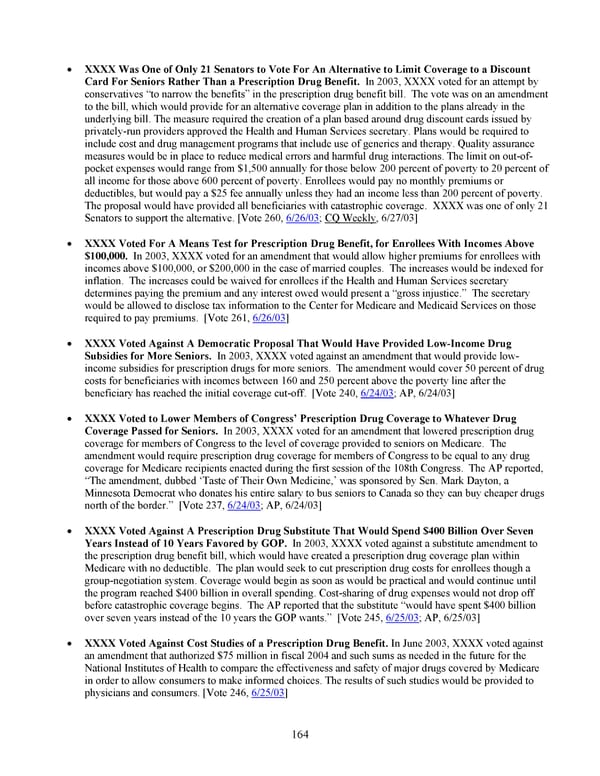XXXX Was One of Only 21 Senators to Vote For An Alternative to Limit Coverage to a Discount Card For Seniors Rather Than a Prescription Drug Benefit. In 2003, XXXX voted for an attempt by conservatives “to narrow the benefits” in the prescription drug benefit bill. The vote was on an amendment to the bill, which would provide for an alternative coverage plan in addition to the plans already in the underlying bill. The measure required the creation of a plan based around drug discount cards issued by privately-run providers approved the Health and Human Services secretary. Plans would be required to include cost and drug management programs that include use of generics and therapy. Quality assurance measures would be in place to reduce medical errors and harmful drug interactions. The limit on out-of- pocket expenses would range from $1,500 annually for those below 200 percent of poverty to 20 percent of all income for those above 600 percent of poverty. Enrollees would pay no monthly premiums or deductibles, but would pay a $25 fee annually unless they had an income less than 200 percent of poverty. The proposal would have provided all beneficiaries with catastrophic coverage. XXXX was one of only 21 Senators to support the alternative. [Vote 260, 6/26/03; CQ Weekly, 6/27/03] XXXX Voted For A Means Test for Prescription Drug Benefit, for Enrollees With Incomes Above $100,000. In 2003, XXXX voted for an amendment that would allow higher premiums for enrollees with incomes above $100,000, or $200,000 in the case of married couples. The increases would be indexed for inflation. The increases could be waived for enrollees if the Health and Human Services secretary determines paying the premium and any interest owed would present a “gross injustice.” The secretary would be allowed to disclose tax information to the Center for Medicare and Medicaid Services on those required to pay premiums. [Vote 261, 6/26/03] XXXX Voted Against A Democratic Proposal That Would Have Provided Low-Income Drug Subsidies for More Seniors. In 2003, XXXX voted against an amendment that would provide low- income subsidies for prescription drugs for more seniors. The amendment would cover 50 percent of drug costs for beneficiaries with incomes between 160 and 250 percent above the poverty line after the beneficiary has reached the initial coverage cut-off. [Vote 240, 6/24/03; AP, 6/24/03] XXXX Voted to Lower Members of Congress’ Prescription Drug Coverage to Whatever Drug Coverage Passed for Seniors. In 2003, XXXX voted for an amendment that lowered prescription drug coverage for members of Congress to the level of coverage provided to seniors on Medicare. The amendment would require prescription drug coverage for members of Congress to be equal to any drug coverage for Medicare recipients enacted during the first session of the 108th Congress. The AP reported, “The amendment, dubbed ‘Taste of Their Own Medicine,’ was sponsored by Sen. Mark Dayton, a Minnesota Democrat who donates his entire salary to bus seniors to Canada so they can buy cheaper drugs north of the border.” [Vote 237, 6/24/03; AP, 6/24/03] XXXX Voted Against A Prescription Drug Substitute That Would Spend $400 Billion Over Seven Years Instead of 10 Years Favored by GOP. In 2003, XXXX voted against a substitute amendment to the prescription drug benefit bill, which would have created a prescription drug coverage plan within Medicare with no deductible. The plan would seek to cut prescription drug costs for enrollees though a group-negotiation system. Coverage would begin as soon as would be practical and would continue until the program reached $400 billion in overall spending. Cost-sharing of drug expenses would not drop off before catastrophic coverage begins. The AP reported that the substitute “would have spent $400 billion over seven years instead of the 10 years the GOP wants.” [Vote 245, 6/25/03; AP, 6/25/03] XXXX Voted Against Cost Studies of a Prescription Drug Benefit. In June 2003, XXXX voted against an amendment that authorized $75 million in fiscal 2004 and such sums as needed in the future for the National Institutes of Health to compare the effectiveness and safety of major drugs covered by Medicare in order to allow consumers to make informed choices. The results of such studies would be provided to physicians and consumers. [Vote 246, 6/25/03] 164
 HRC vote skeleton Page 177 Page 179
HRC vote skeleton Page 177 Page 179